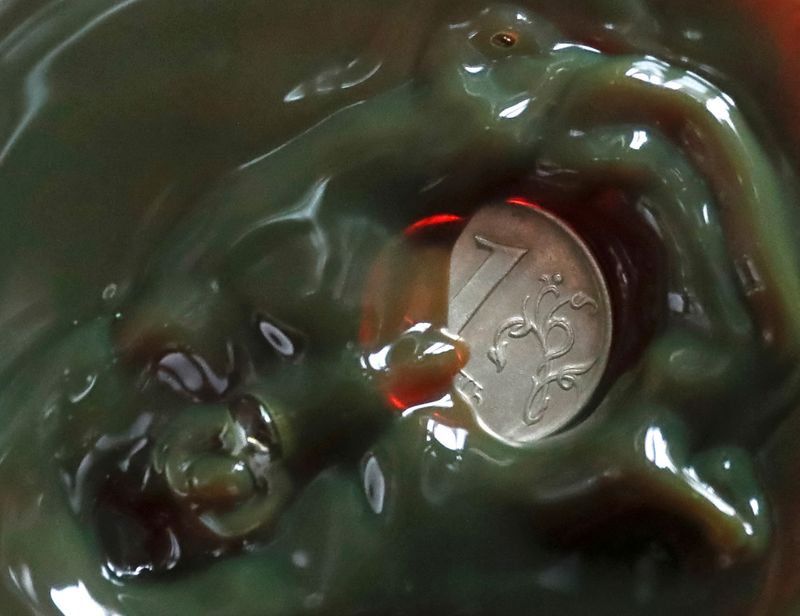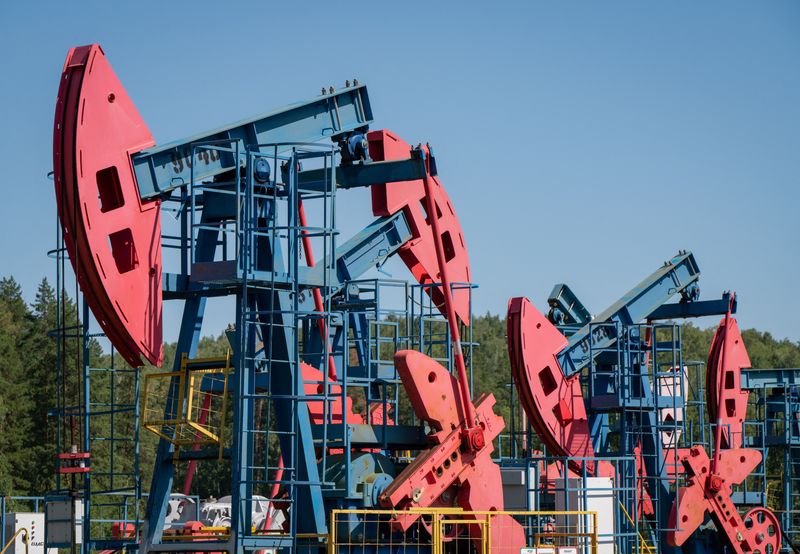By Chen Aizhu, Trixie Yap and Florence Tan
SINGAPORE (Reuters) -When Shandong Yulong Petrochemical opened its Singapore office a year ago, the company staged a lion dance to herald prosperity for the new $20 billion oil refiner at the centre of modernisation efforts in its home province in China.

But Yulong’s ambition to rub shoulders with global heavyweights, backed by Beijing’s push to modernise its refiners, was upended on October 15, when the UK sanctioned it for dealing in Russian oil. The European Union followed suit a week later. Neither the EU nor the UK said Yulong violated sanction-related price caps.
The effect was immediate: Yulong’s non-Russian suppliers, foreign customers, banks and vendors ran for the exits, Reuters reporting shows, leaving it with little option but to buy even more Russian oil, a consequence of widening Western measures to curb Moscow’s oil revenue as its Ukraine war continues.
Going after Yulong marked an escalation in Western efforts to disrupt Russia’s oil flows. Previously, Western blacklistings of Chinese firms focused mainly on smaller operators, often for violating U.S. prohibitions against importing Iranian oil.
Reuters is reporting for the first time the extent of the disruption to Yulong’s operations caused by sanctions, which have taken some of the shine off China’s newest refinery project, limited its crude sourcing and forced it to turn inward.
Yulong did not respond to requests for comment.
“These designations are part of a developing trend in the UK and EU’s approach to sanctions; namely to target third-country actors that are perceived to be acting contrary to EU and UK foreign policy objectives,” said Alexander Brandt, sanctions partner at law firm Reed Smith.
“Such measures are increasingly akin to aspects of U.S. secondary sanctions,” he said.
The growing ranks of sanctioned participants in China and around the world have been forced to deal with an expanding network of producers, refiners, middlemen and the “shadow fleet” ships on the blacklisted side of a bifurcated global oil industry.
Within days of the UK censure, Yulong’s mainstream crude suppliers – including BP, TotalEnergies, Saudi Aramco, PetroChina and Trafigura – cancelled shipments, Reuters reported last month, afraid of incurring secondary sanctions.
In Yulong’s Singapore office, where a team of around 10 is led by an ex-Chinese state oil executive, staffers lost access to service providers including trading platform Intercontinental Exchange, information provider LSEG and at least one European brokerage, people familiar with the matter said.
ICE and LSEG declined to comment.
“Nobody seemed to have a contingency plan in place,” one of the trading sources said, declining to be identified given the sensitivity of the matter.
Yulong’s Singapore office, the main contractual party for its global supplies, lost services from banks in the city-state, two sources said. Yulong’s banks in Singapore included local branches of Agricultural Bank of China and Bank of China as well as UOB and OCBC, according to the Accounting and Corporate Regulatory Authority.
“OCBC Group has always complied strictly with our robust sanctions policy as well as the laws and regulations in all the jurisdictions the group operates in,” an OCBC spokesperson said.
None of the other banks responded to requests for comment.
Yulong’s export customers also got cold feet: regular buyers including global traders Vitol and Gunvor suspended purchases of petrochemicals like methyl tert-butyl ether and toluene beyond a November 13 grace period, two people familiar with the matter said.
China’s Wanhua Chemicals, which has several Western clients, also halted benzene purchases, three sources said.
Vitol declined to comment; Wanhua and Gunvor did not respond to requests for comment.
India-based refiner Nayara, which is Russian-owned, was also cut off by many of its counterparties when the EU sanctioned it over Russian oil purchases in July. Since then, it has been importing crude from Russia exclusively.
Rajesh Chopra, an analyst with energy consultancy XAnalysts, said stepped-up Russian crude buying by sanctioned refiners is an unintended consequence.
“These sanctions are proving … kind of counterproductive because instead of stopping the Russian crude processing in those complexes, it’s not giving the sanctioned refiners any other option but to process more Russian crude,” he said.
The UK declined to comment and the EU did not respond to a request for comment.
On the day that the UK sanctions were unveiled, one panicked supplier told Yulong it wanted to cancel a fully paid 2-million-barrel Middle Eastern oil shipment worth around $130 million that was about to discharge at Shandong’s Yantai port, a person briefed by Yulong said. The cargo was later delivered within a grace period.
Over several days, Yulong’s suppliers cancelled at least half a dozen shipments.
TOP RUSSIAN BUYER
To plug the gap left by mainstream suppliers, Yulong snapped up 15 cargoes of Russian oil for November, roughly doubling its typical monthly intake, traders said. Yulong added more than 10 Russian cargoes for December delivery, traders said.
Yulong opened its 400,000 barrel-per-day refinery last year and lined up supplies from Oman, the United Arab Emirates, Canada and Russia.
Yulong’s Russian shipments accounted for 40% to 50% of its crude purchases before the sanctions hit, according to three traders and two analysts, making the refinery Moscow’s single-largest Chinese client. At present, Russian oil accounts for most if not all of its imports, multiple traders said.
Russian oil seemed like a safe bet given that Moscow is a longtime supplier to China, including its state-run oil giants, and its trade is not prohibited if it complies with a Western-imposed price cap.
In sanctioning Yulong, the UK and EU cited its dealing in Russian oil, benefiting Moscow, but did not mention the price cap.
Beijing, which has close ties with Moscow, has rejected unilateral sanctions and criticised Yulong’s blacklisting.
Russian oil – mainly the ESPO blend, Russia’s flagship grade for Asian markets, which is typically cheaper than Middle Eastern equivalents and takes less than a week to ship from Russia’s Far East – is a favourite of refiners in China’s Shandong province.
With few alternatives, traders said they expect Yulong to rely even more on Russian oil, which at a current discount of over $5 versus the Middle Eastern benchmark, will bolster the loss-making firm’s margins.
“Overall, it’s a blessing in disguise,” said a Chinese executive who deals in Russian oil. “With cheaper, abundant Russian oil, Yulong could fly high and fly free.”
YULONG: PAST, PRESENT AND FUTURE
The Yulong project was greenlit by Beijing as part of a push to create stronger industrial firms with international standing while consolidating and modernising Shandong’s crowded refining sector, where some smaller independent operators dubbed “teapots” have been known to evade taxes and flout government limits on crude imports.
In 2023, talks began with Saudi Aramco to take a 10% stake in Yulong, along with a long-term supply deal. Reuters could not determine the status of those talks. Aramco did not respond to a request for comment.
Yulong was founded by private aluminium smelter Nanshan Group, but state-controlled Shandong Energy Group is its second-biggest shareholder.
That has allowed Yulong to operate in some ways like a state company, according to five sources familiar with Yulong, which has meant avoiding cheap Iranian and Venezuelan oil favoured by teapots for fear of exposure to secondary U.S. penalties.
Market participants expect Yulong to find workarounds to Western restrictions.
It is already diverting more petrochemical output to the domestic market after export clients stopped buying, enabling it to limit declines in refinery runs, over 10 traders said. A downstream unit that Yulong is set to bring online next year could absorb even more production.
Yulong could segregate some of its business in a separate corporate entity, industry sources said, a structure adopted by U.S.-sanctioned refiners Shouguang Luqing and Shengxing Chemical, with the intention of allowing counterparties to deal with non-sanctioned entities.
Yulong, whose November purchases of Russian oil will cost it roughly $660 million based on market prices, must also find new financing channels and may rely more on Chinese non-bank credit providers, three traders said.
Xiamen Xiangyu Group, a government-backed trader, is expected to continue financing Yulong’s purchases, two sources close to Xiangyu said. As a middleman, Xiangyu typically pays on behalf of Yulong for Russian cargoes, becomes the owner of the oil on paper and allows the refiner 30 days to repay with interest. Xiangyu did not respond to a request for comment.
Yulong could also seek credit from its suppliers of Russian oil now that it is an even bigger client, said the Chinese executive who deals in Russian oil.
($1 = 7.1230 Chinese yuan renminbi)
(Reporting by Chen Aizhu, Trixie Yap and Florence Tan; Additional reporting by Yantoultra Ngui; Editing by Tony Munroe and Thomas Derpinghaus)



